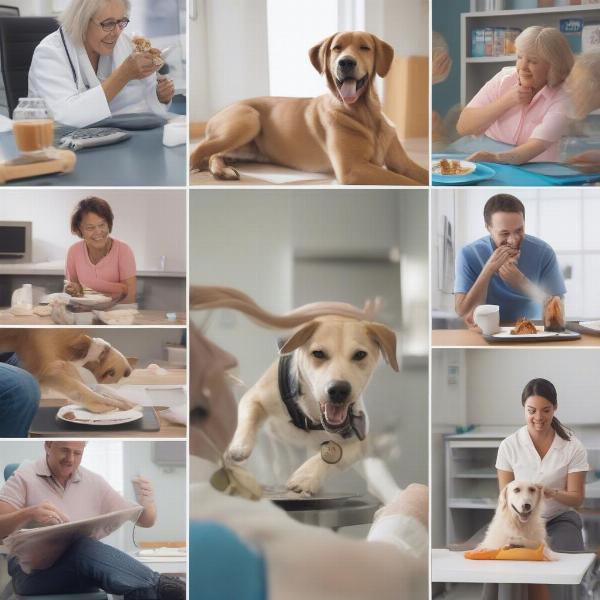A dog’s internal organs, much like our own, are a complex and fascinating system working together to keep them healthy and active. Understanding the basic functions of these vital components is crucial for every dog owner, whether you’re a seasoned expert or just starting your journey with a furry companion. This knowledge can help you recognize potential health issues, understand your vet’s explanations, and make informed decisions about your dog’s care. Knowing what’s going on inside can help you keep your dog happy and healthy for years to come.
Key Internal Organs and Their Functions
A dog’s body is a marvel of biological engineering. Let’s delve into some of the most vital internal organs and their roles.
The Heart: The Engine Room
The heart, the tireless pump, circulates blood throughout the body, delivering oxygen and nutrients to tissues and removing waste products. Just like in humans, a healthy canine heart is essential for overall well-being.
A dog’s heart rate can vary depending on their size, age, and activity level. Smaller dogs tend to have faster heart rates than larger breeds.
The Lungs: Breathing Easy
The lungs are responsible for gas exchange, taking in oxygen from the air and releasing carbon dioxide. Keeping your dog’s lungs healthy is paramount, especially for brachycephalic breeds (those with short noses) who can be prone to respiratory problems.
The Liver: A Multi-Tasking Powerhouse
The liver is a crucial organ involved in numerous functions, including filtering toxins from the blood, producing bile for digestion, and storing energy. Liver health is vital for a dog’s overall well-being.
The Kidneys: Waste Management Experts
The kidneys work tirelessly to filter waste products from the blood and regulate fluid balance. Kidney problems can be serious, so regular veterinary check-ups are essential.
The Stomach and Intestines: The Digestive System
The stomach and intestines break down food, absorbing nutrients and passing waste products. A healthy digestive system is key to a happy, energetic dog. Dietary changes can significantly impact digestive health, so choose a food that’s right for your dog’s age, breed, and activity level.
The Spleen: Part of the Immune System
The spleen plays an important role in the immune system, filtering blood and removing old or damaged red blood cells. It also stores white blood cells and platelets, ready to fight infection and aid in blood clotting.
What Can Go Wrong? Common Internal Organ Issues in Dogs
Just like humans, dogs can experience problems with their internal organs. Understanding some common issues can help you be more aware of potential signs and symptoms. These could include eds dogs, heart murmurs, kidney disease, liver dysfunction, and digestive upset. If you notice any changes in your dog’s behavior, appetite, or elimination habits, it’s crucial to consult a veterinarian.
Keeping Your Dog’s Internal Organs Healthy
Providing a balanced diet, regular exercise, and routine veterinary care are essential for maintaining your dog’s internal health. how often to flea and worm dogs is also a vital part of overall health management, as parasites can affect internal organs. Choosing the best senior dog food uk can also be a crucial step in supporting the health of older dogs.
 Healthy Dog Lifestyle
Healthy Dog Lifestyle
Conclusion
Understanding your dog’s internal organs is a crucial part of responsible pet ownership. By familiarizing yourself with their functions and potential problems, you can take proactive steps to keep your furry friend happy and healthy. Remember, regular veterinary check-ups are essential for early detection and treatment of any health issues. A little knowledge can go a long way in ensuring a long and joyful life for your canine companion.
FAQ
- What are the most important internal organs in a dog? The heart, lungs, liver, kidneys, stomach, intestines, and spleen are all vital for a dog’s health.
- How can I tell if my dog has an internal organ problem? Changes in behavior, appetite, energy levels, or elimination habits can be signs of a problem.
- What can I do to keep my dog’s internal organs healthy? Provide a balanced diet, regular exercise, routine veterinary care, and parasite prevention.
- Are certain breeds more prone to internal organ problems? Yes, some breeds are predisposed to certain conditions, such as heart disease or kidney problems.
- What should I do if I suspect my dog has an internal organ problem? Contact your veterinarian immediately for diagnosis and treatment.
- How much does a dog ct scan cost? The cost varies depending on your location and the specific clinic, but it’s an important diagnostic tool for certain conditions.
- Can I give my dog raw diet dog treats? While some owners choose a raw diet, it’s crucial to research thoroughly and consult with your veterinarian to ensure it meets your dog’s nutritional needs.
About ILM Dog
ILM Dog is your trusted international resource for all things dog-related. We provide expert advice on dog breeds, health, training, nutrition, grooming, and much more. From puppy care to senior dog needs, we’re here to support you every step of the way. Whether you’re looking for information on dog breeds and selection or tips on health and medical care, ILM Dog offers a wealth of knowledge to help you provide the best possible care for your canine companion. Contact us today for personalized guidance: email [email protected] or phone +44 20-3965-8624.